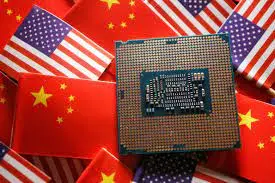China Criticizes U.S. AI Investment Restrictions, Calls for Inclusive Global Governance

China Condemns U.S. AI Investment Restrictions
Introduction and Background
UNITED NATIONS, July 1 (Reuters) – China’s U.N. envoy criticized the United States for targeting certain investments in artificial intelligence (AI) within China, stating that such actions are detrimental to the “healthy development” of AI technology. The comments were made on Monday following the release of U.S. draft rules aimed at restricting investments in AI and other technology sectors in China that could pose a threat to U.S. national security.
U.S. Draft Rules and Chinese Response
Last month, the United States issued draft regulations to ban or require notification for certain investments in AI and other advanced technology sectors in China. These measures are part of a broader strategy to prevent U.S. technological expertise from aiding China’s development of sophisticated technologies and dominating global markets. “We are firmly opposed to these sanctions,” Chinese U.N. Ambassador Fu Cong stated during a press briefing after the 193-member U.N. General Assembly adopted a Chinese-drafted resolution promoting international cooperation on AI capacity-building.
Call for Inclusive Business Environment
International Cooperation and Business Environment
The U.N. resolution, championed by China, urges the international community to “provide and promote a fair, open, inclusive, and non-discriminatory business environment across the life cycle of safe, secure, and trustworthy artificial intelligence systems.” Fu emphasized that the U.S. actions undermine this goal and called on Washington to reconsider its stance. “We don’t believe that the U.S. government’s position or decision will be helpful to the healthy development of AI technology and will, by extension, divide the world in terms of standards and rules governing AI,” he remarked.
Implications for Global AI Governance
Fu’s comments highlight concerns that U.S. restrictions could create divisions in global AI governance, leading to fragmented standards and regulations. The U.S. Treasury Department’s proposed rules, published after President Joe Biden signed an executive order last August, are part of a broader effort to safeguard U.S. technological advancements from bolstering China’s AI capabilities.
Broader Context and Future Outlook
U.S. Executive Order and Global Reactions
The executive order signed by President Biden is designed to ensure that U.S. know-how does not contribute to China’s strategic technological advancements. However, this move has sparked a reaction from China, which argues that such restrictions hinder the collaborative development of AI technology and create a divisive environment in international AI governance.
China’s Push for International AI Standards
China’s initiative at the U.N. reflects its desire to shape global AI standards and promote an inclusive approach to technological development. By advocating for international cooperation and a non-discriminatory business environment, China aims to counteract the perceived negative impacts of U.S. policies on global AI progress.
Conclusion
Navigating AI Governance Amidst Tensions
As the debate over AI investment restrictions continues, the international community faces the challenge of navigating these tensions while fostering a collaborative and inclusive approach to AI governance. The outcome of this debate will have significant implications for the future development and deployment of AI technologies worldwide.
Check out the other AI news and technology events right here in AIfuturize!



